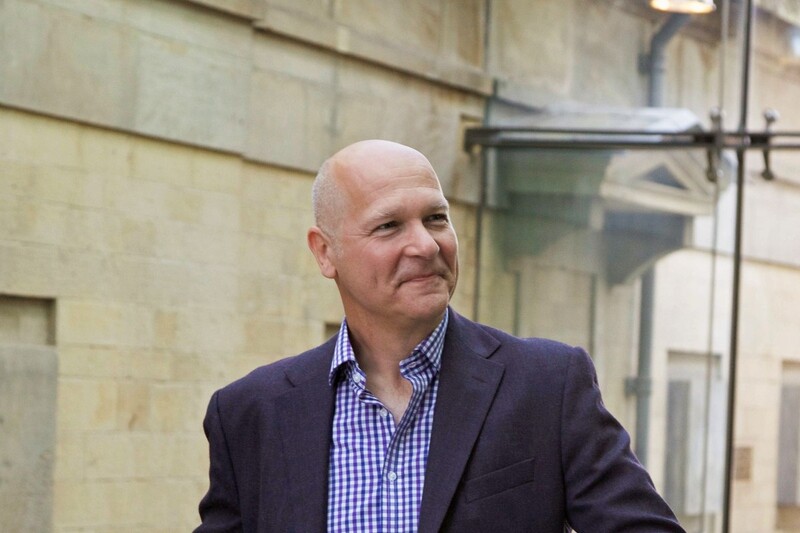How I confront "difficult people" in the workplace
 Amy Assad
Amy AssadIn conversation with Nick Robinson, author of The 9 Types of Difficult People

When Nick Robinson, a professional coach for 25 years, began receiving referrals 12 years ago to coach executives deemed "difficult" by their colleagues, little did he know it would spark a journey into the niche world of complex workplace dynamics.
Robinson found himself intrigued by the challenge of working with people whose behaviours had earned them that label. "It meant you had to really up your game as a coach to be able to help people who maybe weren’t in a good place, or who others were finding difficult," he reflects.
As he delved deeper, Robinson began noticing patterns in how people responded to stress – some withdrew, others kept their heads down while, what he terms, the "revolutionaries" ramped up their efforts. This realisation paved the way for his exploration of different "difficult" personality types in the workplace.
Before becoming a coach, Robinson encountered his own challenging situations at work, with one standing out in particular – While managing one of the biggest post offices in the country in the early 1980s he encountered a disruptive postman who persistently breached security protocols, all during an IRA bombing campaign. “I tried everything to get through to him - shouting, pleading - but never solved that one. It taught me that some people can be truly intractable,” he laments.
While addressing difficult behaviours head-on is necessary, Robinson stresses the importance of doing so skilfully. "For some people, that really looks like grabbing them by the lapels, metaphorically speaking. For others, it’s more gentle – noticing the impact and inviting reflection," he explains.
Robinson also cautions against the pitfalls of rigidly categorising individuals. "Sometimes it’s not helpful to say, ’You’re a type five, you’re a revolutionary,’ because then they kind of look for things to justify being that" he explains. Instead, his approach focuses on understanding these patterns as insights to guide more effective interventions tailored to each person. “It’s not about putting a label on someone for the sake of the label,” Robinson says, “but using that insight to see if there’s a more appropriate way to help that particular person, something that something that suits their patterns and ways of operating.”
A key principle underpinning Robinson’s work is "fierce kindness" – addressing problematic behaviours directly yet with empathy and understanding. "If it doesn’t get through, it doesn’t change anything. There’s no point in doing it," he says, emphasising the importance of creating an environment conducive to positive change.
Reflecting on leadership blind spots, Robinson highlights the tendency to overlook the stresses and unconscious fears that drive reactive behaviours. "You don’t see much of that in leadership theory about how leaders are driven by their own stresses and unconscious fears, just as much as everybody else is".
Robinson admits “the first time you get a big leadership job there’s a sense of ‘I must do well’ or ‘I can’t make mistakes’”. But, he says, the impact of that can be extremely detrimental for team members, “It’s always easy to see that somebody is bringing their own personal fears into managing others”.
One of Robinson’s most impactful coaching experiences involved an individual widely perceived as extremely "difficult" and even monstrous by colleagues. Despite all the prior warnings, Robinson discovered someone deeply stuck and far outside their comfort zone and unable to cope effectively. Six months of coaching managed to create positive shifts in this person’s life and workplace dynamics.
“It was like one of those fairy tales, everybody was really happy afterwards.” Says Robinson who was struck by the stark contrast between the terrifying narratives he had heard and the vulnerability he encountered beyond surface-level perceptions.
Despite these successes, Robinson acknowledges that having someone like him coming in to coach one to one for six months is a large resource for organisations who need to consider first and foremost whether that person is likely to change. “Organisations have to weigh that against the impact they’re having on the whole of your culture – for instance, are people leaving because of them?”
As the ways of working continue to develop, with remote and hybrid work presenting new challenges, Robinson emphasises the pressing need for leaders to build cohesive, collaborative teams that accommodate diverse preferences for proximity and autonomy.
Among the 9 difficult personality types outlined in his book, Robinson also shares that some, such as the reliable "Rock" who stubbornly resists change or the charismatic "Empire Builder" who avoids hard decisions, can often go overlooked as sources of difficulty within teams.
Ultimately Robinson’s work is driven by a deep conviction that the workplace should be a place where individuals feel empowered, able to contribute meaningfully, and forge warm, trusting relationships. "My goal is to try and shift them back into the bit where they are empowered, they can do what needs doing, they can get on well with other people and do things together that we couldn’t possibly do on our own".
Nick Robinson’s ’9 types of difficult people at work’ include:
- The Scary Specialist – the expert in their field who isn’t afraid to let you know it, demanding instant and perfect results.
- The Martyr – has an extremely strong work ethic and cares for others but often refuses to compromise and judges others they see as less principled.
- The Dark Strategist – highly driven and ambitious but can treat others like chess pieces to deliver their plan.
- The Worrier – very detail-focussed with a good sense of right and wrong but may micro-manage and can drop the ball just at the wrong time.
- The Revolutionary – a self-starter who embraces change but often acts without consensus or regard for the fall out.
The 9 Types of Difficult People: How to Spot Them and Quickly Improve Working Relationships, by Nick Robinson (Pearson £14.99)
